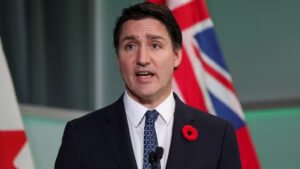![]()
As public opinion in the country turns against high levels of immigration, the Canadian Government announced on Wednesday that it will not increase the intake of permanent residents beginning from 2026.
There may also be changes in the offing when it comes to other categories for newcomers like temporary workers and international students as the statement added the Government will “take action over the next year to recalibrate the number of temporary resident admissions to ensure this aspect of our immigration system also remains sustainable.”
Amid economic anxiety, immigration has been blamed, in part, for impacting housing affordability and placing a burden on health care and infrastructure like transit. This was acknowledged in the release, which said, “This plan is tailored to support economic growth while balancing with the pressures in areas like housing, healthcare and infrastructure. It charts a responsible course for sustainable and stable population growth.”
“By stabilizing the number of newcomers, we recognize that housing, infrastructure planning, and sustainable population growth need to be properly taken into account,” Minister of Immigration, Refugees and Citizenship Marc Miller said.
Immigrants from India form the largest country cohort among new permanent residents or PRs. According to the IRCC’s annual report tabled in Parliament on Wednesday, last year, those from India comprised 118,224 or nearly 27 per cent of the total 437,539 PRs admitted.
The IRCC release, however, added that “newcomers are critical to help spur innovation, grow the economy, and support local businesses and communities.”
But sentiment has turned against maintaining large immigration numbers. A survey released on Monday found that for the first time in decades, an increasing number of Canadians are questioning whether there is too much immigration to the country.
The poll from the independent, non-profit Environics Institute for Survey Research found, “More than four in ten Canadians now strongly (23%) or somewhat (21%) agreeing with the statement, ‘there is too much immigration to Canada,’ up 17 percentage points from one year ago and the largest one-year change ever recorded on this question.”
They were still outnumbered by those who are satisfied with the level of immigration, at 51 per cent, but the pollsters added, “Canadians are now significantly more likely than a year ago to say there is too much immigration to the country, dramatically reversing a trend dating back decades. For the first time, a growing number of Canadians are questioning how many immigrants are arriving, rather than who they are and where they are coming from.”The latest Focus Canada research shows a significant jump in the proportion of Canadians who believe the country accepts too many immigrants, marking a dramatic reversal from a year ago when public support for immigration numbers stood at an all-time high, which at the time marked a rising trend stretching back three decades,” the researchers noted. 






